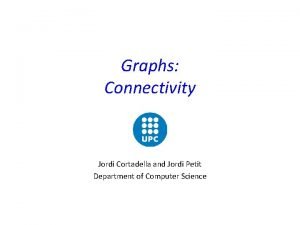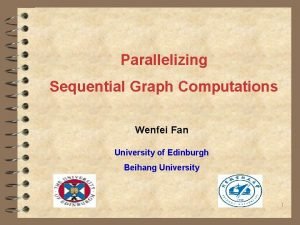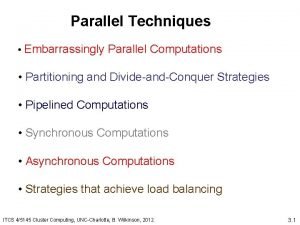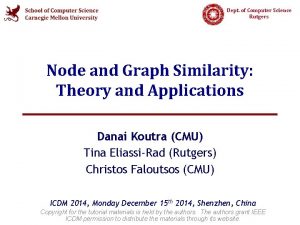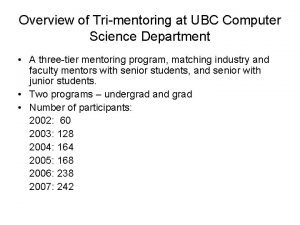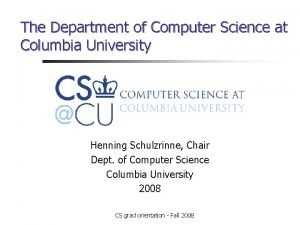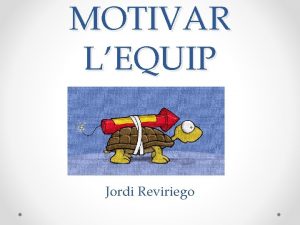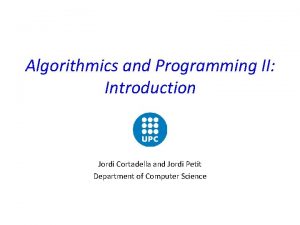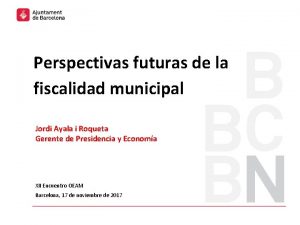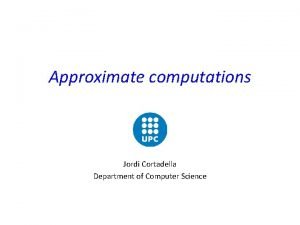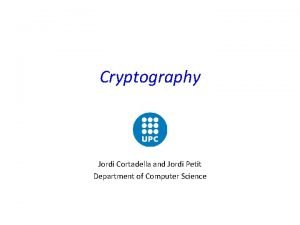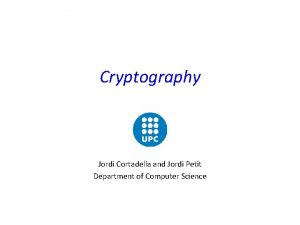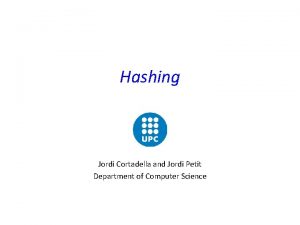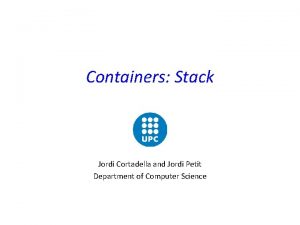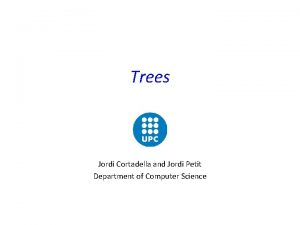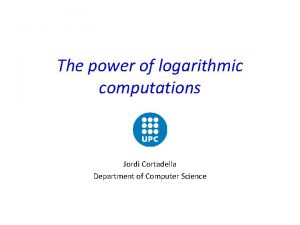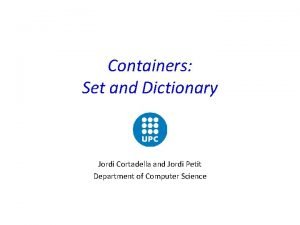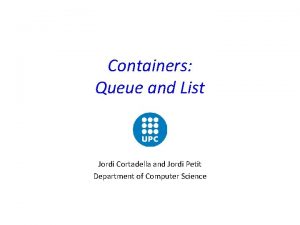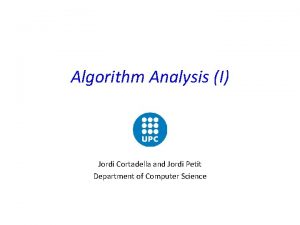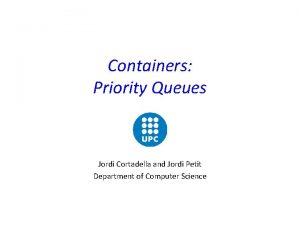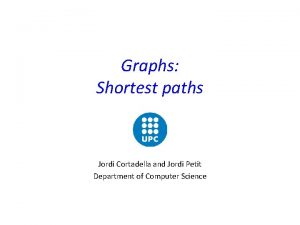Reusing computations Jordi Cortadella Department of Computer Science

















- Slides: 17

Reusing computations Jordi Cortadella Department of Computer Science

Reusing computations • Introduction to Programming © Dept. CS, UPC 2

Calculating • Introduction to Programming © Dept. CS, UPC 3

Calculating • Introduction to Programming © Dept. CS, UPC 4

Calculating : naïve approach def pi(nterms): """Returns an estimation of pi using nterms of the series (nterms > 0) """ sum = 1 # Approximation of /2 # Inv: sum is an approximation of /2 with k terms, # term is the k-th term of the series. for k in range(1, nterms): term = factorial(k)/double_factorial(2 k + 1) sum += term return 2 sum Introduction to Programming © Dept. CS, UPC 5

Calculating : reusing computations • Introduction to Programming © Dept. CS, UPC 6

Calculating more efficiently def pi(nterms): """Returns an estimation of pi using nterms of the series (nterms > 0) """ sum = 1 # Approximation of /2 term = 1 # Current term of the sum # Inv: sum is an approximation of /2 with k terms, # term is the k-th term of the series. for k in range(1, nterms): term *= k/(2*k + 1) sum += term return 2 sum Introduction to Programming © Dept. CS, UPC 7

Calculating • = 3. 14159265358979323846264338327950288. . . • The series approximation: Introduction to Programming nterms 1 5 10 Pi(nterms) 2. 000000 3. 098413 3. 140578 15 20 25 3. 141566 3. 141592 3. 141593 © Dept. CS, UPC 8

Taylor and Maclaurin series • Introduction to Programming © Dept. CS, UPC 9

Calculating sin x • Maclaurin series: • It is a periodic function (period is 2 ) • Convergence improves as x gets closer to zero Introduction to Programming © Dept. CS, UPC 10

Calculating sin x • Reducing the computation to the (-2 , 2 ) interval: • Incremental computation of terms: Introduction to Programming © Dept. CS, UPC 11

Calculating sin x import math def sin_approx(x): """Returns an approximation of sin x. """ k = int(x/(2 math. pi)) x = x – 2 k math. pi # reduce to the (-2 , 2 ) interval term = x x 2 = x x i = 0 sinx = term while abs(term) >= 1 e-8: term = -term x 2/((2 i+2) (2 i+3)) sinx += term i += 1 return sinx Introduction to Programming © Dept. CS, UPC 12

Calculating sin x import math def sin_approx(x): """Returns an approximation of sin x. """ k = int(x/(2 math. pi)) x = x – 2 k math. pi # reduce to the (-2 , 2 ) interval term = x x 2 = x x d = 0 sinx = term while abs(term) >= 1 e-8: d += 2 # d = 2*i+2 term *= -x 2/(d (d+1)) sinx += term return sinx Introduction to Programming © Dept. CS, UPC 13

Combinations • Introduction to Programming © Dept. CS, UPC 14

Combinations def combinations(n, k): """Returns combinations(n k). Pre: n k 0. """ c = 1 for i in range(k, 0, -1): c = c*n/i n -= 1 return c Problem: real division c n/i may not be integer Introduction to Programming © Dept. CS, UPC 15

Combinations: recursive solution def combinations(n, k): """Returns combinations(n k). Pre: n k 0. """ if k == 0: return 1 return n*combinations(n– 1, k– 1)//k Always an integer division! Introduction to Programming © Dept. CS, UPC 16

Conclusions • Try to avoid the brute force to perform complex computations. • Reuse previous computations whenever possible. • Use your knowledge about the domain of the problem to minimize the number of operations. Introduction to Programming © Dept. CS, UPC 17
 Strongly connected components
Strongly connected components Incrementalizing graph algorithms
Incrementalizing graph algorithms Embarrassingly parallel
Embarrassingly parallel Ucl meng computer science
Ucl meng computer science Electrical engineering northwestern
Electrical engineering northwestern Computer science department rutgers
Computer science department rutgers Meredith hutchin stanford
Meredith hutchin stanford Fsu computer science department
Fsu computer science department Ubc computer science department
Ubc computer science department Department of computer science christ
Department of computer science christ Computer science department columbia
Computer science department columbia Jordi reviriego
Jordi reviriego Jordi ustrell
Jordi ustrell Jordi benlliure
Jordi benlliure Language telegram
Language telegram Jordi juanico sabate
Jordi juanico sabate Jordi timmers
Jordi timmers Jordi ayala
Jordi ayala
